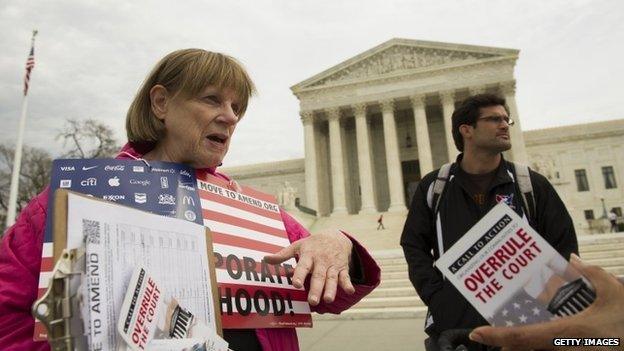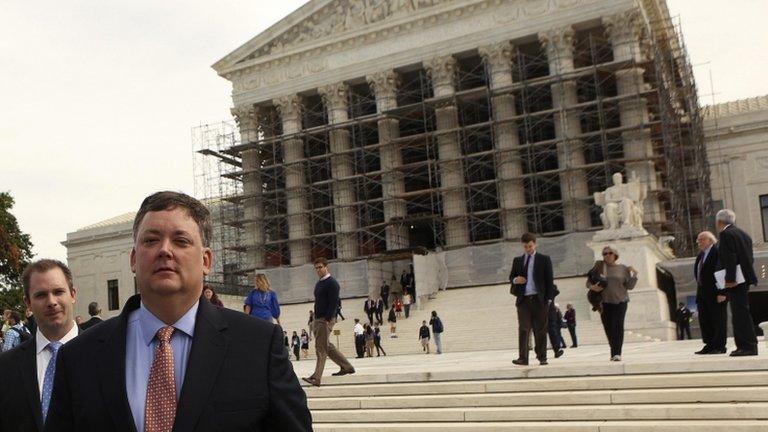US Supreme Court strikes down overall donor limits
- Published

Critics say the ruling will expand even further the influence of big money in politics
The US Supreme Court has struck down overall contribution limits for individual political donors.
The court ruled 5-4 that individuals could give to candidates, parties and political groups without observing an overall cap of $123,200 (£74,000).
The ruling leaves in place the limit on how much a donor can give to a single candidate - currently $2,600 (£1,560).
The decision is the latest in a series which have loosened restrictions on US campaign finance.
Contribution limits were established by Congress in the 1970s in an attempt to restore the public's faith in government after President Richard Nixon's resignation in the Watergate scandal.
'How you choose'
Chief Justice John Roberts wrote in Wednesday's majority opinion, external that overall limits "intrude without justification" on first amendment rights, the clause of the US constitution that enshrines freedom of speech.
Critics say the ruling will expand even further the influence of big money in politics.
Four years ago, the Supreme Court lifted limits on election spending by political action committees, in a landmark case known as Citizens United.
Last year the court removed restrictions on states with a history of race-biased voting laws.
That prompted activists to say the court was making it harder to vote in but easier to buy elections.
Wednesday's decision split the court along its liberal and conservative wings, with Justice Stephen Breyer taking the unusual step of reading his dissent from the bench.
He wrote: "Taken together with [Citizens United], today's decision eviscerates our nation's campaign finance laws, leaving a remnant incapable of dealing with the grave problems of democratic legitimacy that those laws were intended to resolve."
The case was brought by Shaun McCutcheon, a Republican and owner of the Coalmont Electrical Development Corporation in Alabama.
Before the US elections two years ago, Mr McCutcheon made individual donations to 15 congressional candidates.
But he was unable to donate to another dozen candidates because that would have broken the overall limit.
"It's a very important case about your right to spend your money how you choose," Mr McCutcheon has said.
He told the Associated Press news agency that he planned to spend several hundred thousand dollars ahead of November's midterm elections.
The US government's lawyer, Solicitor General Donald Verrilli, argued during the case that without the overall limit, one donor giving the maximum allowed to every congressional candidate, political party and political action committee would top $3m in a single election cycle.
According to the Center for Responsive Politics, 646 donors in the 2012 election cycle hit the overall donation limit.
They gave $93m to candidates and committees.
A $2.5bn election: Where the money comes from
- Published8 October 2013
